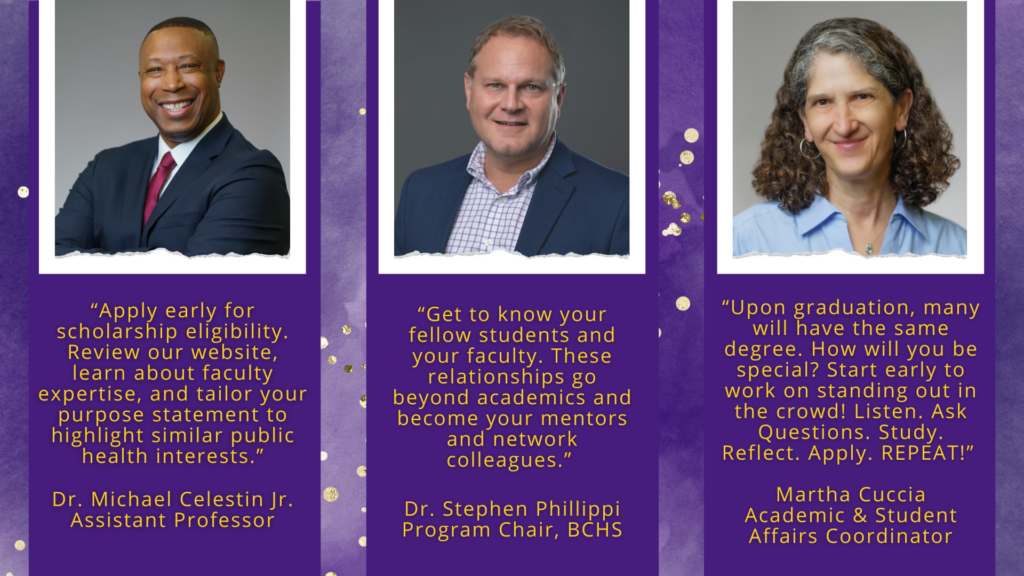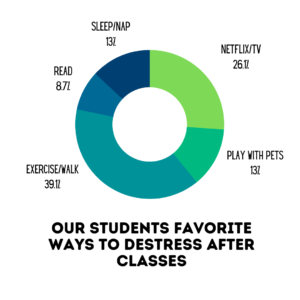
Welcome Video
Advice from Faculty About Studying at LSU School of Public Health

Would you like to chat with a faculty member about various coursework, future career options or research possibilities? Make sure to fill out our form here.
 Advice from Students About Studying at LSU School of Public Health
Advice from Students About Studying at LSU School of Public Health
Campus life is one thing but what is it really like to attend classes with the students and faculty of LSU School of Public Health? It’s a great question and one that we recently asked current students here at the school.
Below you will find the student responses to questions about what were their favorite classes, the best advice they have before starting your studies and what they wish they had known before heading to class on day one.
“Dr. Wennestrom’s BCHS 6216 Health Program Development and Planning Class. She ran the class so well, and I learned a ton. Super fun to build our own program too on topics we are passionate about.”
“EPID6210 – It was interesting to learn the foundations of epidemiology and learning how all of the different research areas of epidemiology/public health intersect at their cores.”
“Environmental Health Policy with Dr. Katner! Requires a lot of reading and research, more project-based then test-based which is my favorite way to learn.”
“Epidemiology for PH Practice because it shows different ways epi can be applied in public health…and Dr. Straif-Bourgeois is great!”
“I’d have to say the Ethics class you have to take in your first Fall Semester. You have a lot of interesting discussions about public health and how classmates feel on certain topics. These discussions are conducted professionally and in a respectful manner so things never get heated which is nice.”
“BCHS 6213 I like the structure of the class because we all have individual projects that we’re working on but during class time he allows us to talk about the community we choose to map and the project we are individually developing; so it’s really interesting to watch/hear everyone’s projects come to life during the semester.”
“Categorical Analysis. Previous students of the class have used their final projects to snag jobs.”
“BIOS6100 – Some of the topics can be challenging to understand but it is necessary to know the foundations of how data is analyzed as you learn the specifics in the epidemiology courses (for epi students).”
“Categorical Data Analysis – I don’t have a math brain, but the professor was super helpful.”
“I would have to say Intermediate Epidemiology just because of the combination of Epi studies but also Epi concepts and biases in a deep manner of understanding.”
“BCHS 6216 Hard because we only had one group assignment for the entire semester so it was really challenging as a first semester student trying to get comfortable in my concentration and with my peers; but the class overall was super beneficial for my MPH career.”
“Design and Analysis was the most challenging because I had no coding experience while most of the class did. I made it though and it was worth it!”

“A pandemic would hit (just kidding – kinda). I wish I knew how to skim-read before starting. There is a lot of reading and while I would like to read everything in depth there just isn’t time. So skimming and writing a summary has been such a timesaver.”
“I wish I would’ve spent more time researching the different disciplines. I don’t regret my choice but it’s true that some are more marketable than others right after school!”
“Don’t be afraid to ask for questions or to reach out to faculty for jobs, internships, being an author on manuscripts etc.”
“The cafeteria has some great food 😋! My favorite is the Gyudon (Japanese Beef and Rice). If I knew earlier, I would’ve started going as soon as possible!”
“How small the school is, which I love by the way!”
“Don’t overdo the workload during your first semester.”
“The MPH program, but the BCHS department specifically are great! Don’t hesitate to reach out because you are scared that you may be a bother, they really care and give great advice!”
“Taking some coding classes before would have helped me out.”

“Listen to music, walk, listen to podcasts, or go down YouTube rabbit holes :)”
“Watch an episode or two of my favorite TV series and spend some time playing with my dogs. It is important to remember to take some time for yourself to let your brain reset.”
“Take a walk in City Park and get some beignets.”
“I go to awakenings studio on Canal Street. They have aerial circus style training and pole dancing.”
“How supportive the faculty/staff is. Everyone works together to help students succeed and when you need help they are always willing and happy to assist.”
“I like that it’s in New Orleans and all of the cross bridges (for walking on campus) are really cool and convenient. Also the library staff, resources, and how they go above and beyond to help you with problems that you have.”
“The community and networking are incredible. There’s so many connections and opportunities.”
“Knowing that they have many professional or mental resources that I can use or ask for if I need.”
“Learning so much from knowledgeable teachers! I also love the different opportunities to work in the community.”
“The willingness to help from anyone. Faculty members are always willing to talk, aid with struggles, and point you in the right direction. The staff is always friendly, from the administrative staff to the custodial staff, everyone always greets you with a smile.”

“1) Figure out how you want to take notes and stick to that method, 2) If you’re having trouble in a class reach out early and often, 3) Be flexible with your career goals, you may begin the program wanting to do one thing and do a 180 by the time you graduate and that’s ok 4) Find your people. Whether they are in your program, department, or even school, build a support network of individual’s who can understand what you are going through.”
“Get involved and don’t be afraid to reach out to faculty for help or to discuss career options!”
“Get involved: join a student organization, seek out an on campus job with one of the many centers of excellence/ research programs on campus (Louisiana Tumor Registry, Louisiana Cancer Prevention and Control Programs, South Central AIDS Education and Training Center to name a few), get to know your peers and help each other out as you go through classes.”
“Go to the cafeteria! You won’t regret it!”
” Pace yourself. Don’t spread yourself thin. Get a tutor before it’s too late.”
“Take the tour of campus! I missed mine during orientation week and since have struggled with navigating the campus”
“If you enter into the public health/epi major do some coding with SAS or STATA before you start. Python and R is also helpful too! Also taking the spatial class is helpful because everyone in public health will love you as a resource if you can make maps.”
Campus Tour
For more information about the LSU Health Sciences campus – including security and safety.
 Frequently Asked Questions
Frequently Asked Questions
Still have questions? Don’t worry – you aren’t the only one!
We know that the application process can be confusing for any student. Below you will find a list of commonly asked questions about attending a graduate program here at the LSU School of Public Health.
The simple answer is NO; you don’t need to have a specific degree to study Public Health. For those seeking to attend our Master of Public Health (MPH) or Master of Science for Biostatistics (MS) there is no required previous coursework or undergraduate degree type. Some programs recommend course work that will be helpful before applying, such as calculus and linear algebra for those applying for the Biostatistics program.
In order to apply for a PhD program, graduate studies in Public Health are preferred but are also not required.
Within our MPH program, there are five concentrations or disciplines. Each tackles similar Public Health issues, but do so in ways unique to that discipline. Depending on your future career goals and your interests, having a concentration in one area over the others will help focus your career options.
If you are on the fence about which Public Health discipline is right for you, don’t worry. We have plenty of resources on hand, including opportunities to speak directly with faculty and students.
The GRE is NOT required for the MPH and MS programs. If you are applying to a PhD program, however, the GRE will be a requirement of the application process.
The LSU School of Public Health coordinates the application process through the Schools of Public Health Application Service (SOPHAS), a centralized admissions system. A list of requirements for the school (MPH, MS and Ph.D. programs) include:
- SOPHAS application & application fee
- Official Transcripts for all previous studies
- Statement of Purpose
- Resume or CV
- Letters of recommendation (3)
- GRE for PhD programs only
In addition to the minimum requirements established for the program of interest, international students must also submit:
- Current scores from the academic version of the Test of English as a Foreign Language (TOEFL) or the English Language Testing System (IELTS). For those international applicants who have completed a degree in the U.S., language assessment may be waived.
- An official World Education Service (WES) or Educational Credential Evaluators (ECE) report. The WES and ECE convert educational credentials into their US equivalents. They describe each transcript, certificate, diploma or degree that you have earned and state its academic equivalency in the US.
For MPH/MS students:
In order to qualify for a scholarship, applicants must have all application materials in by the priority scholarship deadlines for each semester. A list of these deadline dates can be found on our website in the “Tuition and Aid” section. No additional forms are needed.
For PhD students:
A limited number of assistantships are available to full-time students pursuing a PhD in Community Health Sciences, Biostatistics and Epidemiology. Assistantships entail a commitment of up to twenty hours per week working with faculty on research projects or in a teaching capacity.
Our students may find worker opportunities on the LSUHSC campus once they arrive in New Orleans. A student worker position enables them to work up to 20 hours per week, earning above minimum wage. These positions may be on research projects, administration, or operational support activities in the School of Public Health, or other Schools and units in the Health Sciences Center. Discussions take place when students arrive on campus at the start of their program.
In-State Tuition and Fees Per Semester, Full-Time Study:
- $5,325.16 for MPH
- $5,263.50 for MS, PhD
Out-of-State Tuition and Fees Per Semester, Full-Time Study:
- $8,647.03 for MPH
- $9,464.25 for MS, PhD
*costs differ for students attending Part-Time, Summer Sessions, etc.
While many of the classes you will take in these programs certainly fall within the STEM programming guidelines, there is no specific accrediting body that officially deems programs in the United States as STEM certified.
The US Department of Homeland Security does recognize some of the disciplines within Public Health as designated STEM programs, though our generalized MPH degree does not qualify. For more information review https://studyinthestates.dhs.gov.
